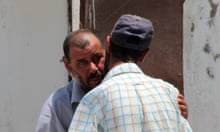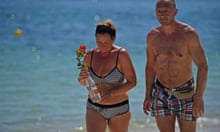The spread of Islamic State into the “ungoverned territory” of Libya helped sow the seeds for the atrocity which left up to 30 Britons dead at a Tunisian beach resort, the foreign secretary Philip Hammond said as it was confirmed that the terrorist responsible for the killings had travelled to an Isis training camp in Libya in January.
Hammond said the presence of Isis in the largely lawless Libya posed a threat to neighbouring countries “which sadly we have seen realised”.
The foreign secretary was speaking as the first of the murdered British tourists are repatriated on Wednesday morning to RAF Brize Norton, where their families will await them.
So far 22 of the Britons killed have been positively identified, but it is expected as many as eight more will be named in the next 24 hours. Almost all are likely to be repatriated via Brize Norton, although families have been given the option to make private arrangements if they prefer.
The bodies will then be transported on for private funerals across the UK and a west London coroner has been appointed to oversee the inquests into their deaths. The government is making plans to protect the families from media intrusion.
All wounded Britons have been repatriated, including four severely injured people who were brought back by a Royal Air Force C17 transport plane on Monday.
It is expected there will be a second flight of bodies into Brize Norton later in the week once they have been positively identified, a process that appears to be taking a long time partly due to formalities. As many as 50 UK security and foreign office officials are on the ground in Tunisia helping with the government investigation or the transfer of bodies.
Downing Street has repeatedly stressed the investigation into the killings is Tunisian-led, but it confirmed there were links between the killer Seifeddine Rezgui and an Isis training camp in Libya.
The suggestion that Rezgui possibly trained alongside a group that murdered 20 people in March at the Bardo national museum in Tunis has disturbed British officials and puts pressure on the UK government to rethink its travel advice for citizens planning to go on holiday in coastal Tunisia.
Hammond defended the UK’s role in tackling Isis, saying: “I think the thing that has changed is the spread of Isil into the ungoverned territory of Libya, a neighbouring country to Tunisia.
“We have been dealing with Isil in Syria and Iraq, we have a significant military operation in Iraq where we are delivering the second largest number of air strikes against Isil targets. But as Isil has spread across Libya in this ungoverned space it has posed a threat not just to us but to the neighbouring countries, which sadly we have seen realised in this attack in Tunisia.”
Downing Street said that David Cameron’s talk of a “full spectrum” response to Islamic extremism was unlikely to include a fresh attempt to win parliament’s support for a bombing campaign against Isis in Syria. There is no sign yet that Labour leadership candidates are prepared to change the party’s opposition to such military action.
Number 10 also confirmed they are reactivating plans to require universities to do more by statute to prevent radicalisation on campus, a proposal that was blocked in the Lords and opposed by the Liberal Democrats ahead of the election on grounds of free speech. Councils, prisons, the NHS and schools from today come under a new statutory duty to look out for signs of being radicalised.
Security minister John Hayes said: “We have seen all too starkly and tragically the dangers of radicalisation and the devastating impact it can have on individuals, families and communities.
“The new Prevent duty is about protecting people from the poisonous and pernicious influence of extremist ideas that are used to legitimise terrorism.
“Protecting those who are vulnerable and at risk of radicalisation is a job for all of us. The duty will also cover universities and colleges and will be commenced for these institutions once further guidance on extremist speakers has been published.”
Asked to come up with an example of behaviour that might be a cause for concern in schools, the education secretary Nicky Morgan said: “Sadly, Isis are extremely intolerant of homosexuality.”
She was asked whether a pupil who said they thought homosexuality was “evil” would be reported to the police. Morgan said it would “depend very much on the context of the discussion” and schools were capable of using their judgment.






